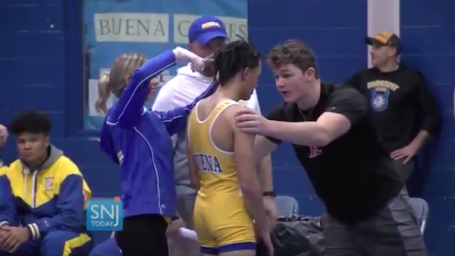NO MATTER how natural it is to us, black hair is often seen as a peculiarity to those outside our community.
No matter how free our curls and kinks, they are never too far from an organisation or individual seeking to “tame” them as if they are a wild beast, out of control, or at least out of that individual or organisation’s control. And while I’d love for it to be that that is always the case, that those who seek to control our curls and kinks never get to, we’re all aware that that’s not true.
Some hairstyles are subject to more fetishisation, more racist comments and physical policing than others. Afros and canerow hairstyles, for example, are sometimes banned from private places of work, educational institutions and governmental bodies.
The argument given time and time again is that hair styled in such ways is untidy, unprofessional and unkempt.
Those with little or no knowledge of black hair often don’t understand the necessity of protective styles, the age-old traditions of caring for our crowns or the intimate relationship we can have with our locks. And sometimes they do, and seek to strip us of our individuality, our identity and force us to conform.
Our hair holds power and not everyone wants us to be powerful.
Dreadlocks are often especially demonised too. Whether worn for reasons of faith or not, they are assigned negative connotations by those for whom are hair isn’t just an issue – but our skin too.
The Voice has reported on such incidents where children have been subjected to policing of their hair. Chikayzea Flanders, a 12-year-old former pupil at Fulham Boys School was banned from returning to the school until he cut his hair. He has dreadlocks.
In South Africa in 2016, black schoolgirls at Pretoria Girls High protested after they were told they had to straighten their hair. The girls defied the school’s racist policy and wore their hair in afros and natural styles.
In October last year, a mother revealed that her seven-year-old mixed-race daughter, Tru, had her hair shaved off without her permission at a group home in Massachusetts. According to the mother’s lawyer, a volunteer at the school had told her that by shaving her daughter’s hair it would “grow back straight”.
These cases, just a few of those that made headlines in recent years, weren’t the first and, sadly, they’re highly unlikely to be the last.
Last week, a mixed-race teenage wrestler was told by a white referee that he could not compete in a match unless he cut off his dreadlocks.
Andrew Johnson, who is just 16 years old, chose to have his hair cut by his trainer there and then instead of forfeiting. But it wasn’t a free choice.
In a statement issued on behalf of Johnson and his family, their lawyer, Dominic A Speziali, said: “Andrew was visibly shaken after he and his coaches made every effort to satisfy the referee short of having his hair cut. But, as captured on video, the unyielding referee gave Andrew 90 seconds to either forfeit his match or cut his hair.
“Under duress but without any influence from the coaching staff or the athletic trainer, Andrew decided to have his hair cut rather than forfeit the match.”
Footage of the moment Buena Regiona high school athlete’s hair was being cut went viral on social media. It has been viewed almost 15 million times.
Andrew Johnson’s experience has enraged many black people. Personally, watching it made me feel sick. My mother had the same reaction. So did many others.
Director Ava Duvernay was one of the high profile figures who spoke about the incident.
She said: “I don’t just wear locs. They are a part of me. A gift to me. They mean something to me. So to watch this young man’s ordeal, wrecked me. The criminalization of what grows from him. The theft of what was his. Two hours of calls [with] officials yesterday. Two hours of heartache.”
Hair is personal, political and this infringement on individuality and a failure to recognise the value of black hair – in the case of the staff – or the deliberate disregard of it – in the case of the referee, is deplorable.
So far the referee, Alan Maloney, has been suspended as an investigation into the incident is underway. The New Jersey State Interscholastic Athletic Association, the body responsible for the state’s school sports has referred the incident to the state attorney general’s office. There are also calls for him to receive a lifetime ban, that’s certainly a start. But beyond that, the sport’s policies are clearly in need of an update – as are those in schools and organisations right here in the UK.
No other black person should have to experience what Andrew Johnson, the pupils at Pretoria Girls High, Chikayzea Flanders or the seven-year-old Tru in Massachusetts did.


Comments Form